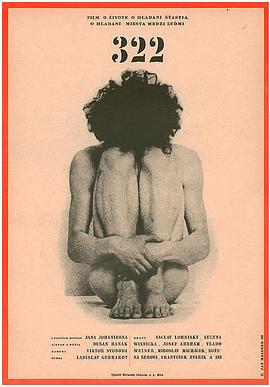夜车1959
去年過世的波蘭導演耶吉‧卡瓦萊洛威茲,是「Polish Film School運動」中的代表人物之一。其作品擅長以影像呈現細膩的細節,累積給予觀者強烈的震撼力。議題圍繞個人在社會備受政治或戰爭壓迫下,人性的掙扎與道德的選擇。這些深具豐富意涵的創作文本,也讓他的作品深受影壇重視。1951年拍攝首部劇情長片《The Village Mill》,隨後完成《Shadow》(1956) ,以及本片《夜車》,這些影片都被視為相當具時代代表性的波蘭電影。卡瓦萊洛威茲亦曾主掌知名的KADR 製作部門,安德烈華依達、塔都茲考威克(Tadeusz Konwicki) 和尤利斯馬休斯基(Juliusz Machulski)都曾在其製作部門工作。他最為人所熟知的影片莫過於1961年的《修女約安娜》,以及1966年改編自Bolesław Prus的歷史小說《Pharaoh》,本片亦入圍了1967的奧斯卡最佳外語片。 《夜車》敘述一對男女Jerzy和Marta意外地在前往波羅地海邊Hel的夜車上共處一室。一表人才的Jerzy狀似緊張,看來像是在逃避追趕,Marta剛開始也沉默不言,慢慢的兩人才成為朋友。在車上還有愛慕著Marta的男孩Staszek,以及擁有豔光四射的年輕太太的老律師。當火車停靠在一個小站裡,警方上車開始搜索畏罪潛逃的殺人犯時,流言開始四起,都將警方要緝捕的對象,指向這個車廂中的Jerzy和Marta…。 不同於當時深受義大利新寫實主義影響的「Polish Film School運動」作品,《夜車》瀰漫著希區考克式的懸疑詭譎氣氛。全片的劇情推展在火車內進行,封閉的車廂成為卡瓦萊洛威茲最好的發展空間。火車上乘客間彼此的猜忌與不信任,可說是當時波蘭共產社會的最佳寫照,也是一部波蘭影史重要的傑作。
| 演员 | 卢茜娜·温尼斯卡 / 莱昂·涅姆奇克 / Teresa Szmigielówna |
| 导演 | 耶尔齐·卡瓦莱罗维奇 |
| 地区 | 其它 |
| 语言 | 其它 |
| 类型 | 爱情片 |
| 豆瓣 | 8.2 |
| 年份 | 1959 |
| 更新 | 2023-02-12 |
相关影视推荐
你往何处去
玛格达莱娜·米尔卡兹,帕维·德朗柯,博古斯瓦夫·林达
指挥官维尼裘斯(帕维·德朗柯 Pawel Delag 饰)深深的爱着身在罗马的人质公主丽姬娅(玛达琳娜·米尔卡兹 Magdalena Mielcarz 饰),于是,残暴的尼禄皇帝(克兹佐夫·马扎克 Krzysztof Majchrzak 饰)将丽姬娅赏赐给了维尼裘斯为妻。然而,丽姬娅公主是一个虔诚的基督教徒,她不能忍受维尼裘斯靠杀戮和掠夺过活,丽姬娅选择了离开维尼裘斯。 为了挽回丽姬娅,维尼裘斯找到了基督教的秘密集会处,开始聆听教义,试图理解基督教的核心思想,想通过此走进丽姬娅的内心。当维尼裘斯回宫时,尼禄皇帝正在焚烧罗马城,而丽姬娅就在其中,维尼裘斯闯入火海救出了爱人。皇后非常嫉妒维尼裘斯和丽姬娅之间坚贞的爱情,于是设计陷害。
修女乔安娜
卢茜娜·温尼斯卡,安娜·齐皮勒夫斯卡,玛丽亚·赫瓦利布格,弗朗齐歇克·皮耶奇卡,Halina Billing-Wohl,Mieczyslaw Voit,Kazimierz Fabisiak,Stanislaw Jasiukiewicz,Zygmunt Zintel,Jerzy Kaczmarek,Jaroslaw Kuszewski,Marian Nosek,Jerzy Walden,Marian Nowak,Zygmunt Malawski,Stanislaw Szymczyk
故事发生在十七世纪的波兰。书亚(Mieczyslaw Voit 饰)是一名德高望重的神父,坚定的坚持着自己对主的信仰和理想。某一日,他被派往了一间修道院中工作,有传闻魔鬼偷偷潜入了这间修道院,在其中作祟。 修道院的院长是一个名为乔安(卢茜娜·温尼斯卡 Lucyna Winnicka 饰)的女人,这个女人的身上散发出一股强大而又神秘的美丽,让众多的修女们为之疯狂。随着时间的推移,神父书亚发现魔鬼的力量实在是过去强大,仅凭他一人之力无法驾驭,于是向一个老法师寻求帮助。然而,最终,书亚亦没有能够拒绝魔鬼的诱惑,为了帮助乔安,他甚至犯下了杀人的罪孽。
法老
耶日·泽尔尼克,维斯瓦娃·马祖尔凯维奇,芭芭拉·布雷尔斯卡 Barbara Brylska
公元前11世纪,古埃及面临多重困难,外部有亚述人的战争威胁,又欠下腓尼基商人的大笔债款,国家濒临破产,人民穷困潦倒。拉美西斯十二世病重去世,他的儿子拉美西斯十三世被宣布为法老继承人。为了阻止埃及的迅速衰落,年轻的拉美西斯十三世决定夺取世世代代存放在神庙中的宝藏,将其用于社会改革和对亚述发动战争。但神职人员反对他的计划,祭司和年轻的法老之间开始了政治和宗教斗争。
322档案
Václav Lohniský,卢茜娜·温尼斯卡,约瑟夫·阿布汉姆,米罗斯拉夫·马哈切克,弗兰季塞克·兹瓦里克,Vladimír Weiser,Emil Horváth St.,Viktor Blaho,Jana Svandová,Bozena Sérová,Marta Raslová,卡雷尔·奥古斯塔,Zdenek Blazek,Olga Chodáková,Milan Hrabinský,Michal Kozuch,米库拉斯·洛迪津斯凯,Anton Trón
Mannheim-Heidelberg International Filmfestival YearResultAwardCategory/Recipient(s) 1969 Won Grand Prize Dusan Hanák A government official in Czechoslovakia mistakenly believes he has cancer. He reasons his involvement in clandestine activities during the Stalin administration have fated him to die from a dreaded disease. He searches for inner peace as he feels the guilt of his past transgressions. This film tied for the Grand Prize at the Mannheim Film Festival in 1969. Slovak director Dusan Hanak was one of Czech cinema's brightest and best talents of the '60s and '70s, but because of censorship this was not manifest until the late '80s. Dusan made an impact on the film world with his auspicious debut 322 (1969). Though banned until 1988, when it was finally released, it earned international acclaim and the Grand Prix award at the Mannheim Film Festival. Hanak's sophomore effort, the documentary Obrazy Stareho Sveta/Image of an Old World (completed in 1972), was also not released until 1988 and neither was his 1980 film Ja Milujem, Ty Milujes/I Love You, You Love. Only Hanak's 1976 film Ruzove Sny/Rose-Tinted Dreams passed muster with censors and saw a timely release.
等待方舟
耶日·斯图尔,克里斯提娜·杨达,卡里娜·谢鲁斯克,马里乌什·德莫霍夫斯基,马雷克·瓦尔切夫斯基,扬·诺维茨基,亨里克·比斯塔,莱昂·涅姆奇克,克兹佐夫·马扎克,斯坦尼斯瓦夫·伊加尔
Set in an underground dungeon inhabited by bundled, ragged human beings, after the nuclear holocaust. The story follows the wanderings of a hero through the situations of survival. People wait for the Ark to arrive and rescue them while their habitat falls apart. Delving deep into the dusty and long abandonded vaults of b-cinema in search of lost gems always leaves me with a bittersweet taste. On one hand the discovery of unexpected gems where no one would think them possible is a rewarding experience. On the other hand though it makes one wonder how many of these remarkable low-budget oddities, personal love affairs of directors never quite famous and now all but forgotten, have almost forever slipped from memory? n any case what we have here is a little post-apocalyptic gem from Poland that is really better than it has any right to. The dystopian near future of O-BI, O-BA finds a group of survivors of the nuclear war that ravaged the Earth inhabiting an underworld concrete bunker and biding their time as they wait for the mysterious Ark, an air ship of some kind that will come and save them. The Ark proves to be an elaborate hoax, carefully designed to give hope to the malnourished and desperate denizens of the bunker, while in the meantime the dome that separates their miserable existence from the nuclear winter outside is slowly caving in. What first striked me about the movie is the design of the bunker and the depiction of the survivors. The survivors are gaunt, filthy and terrible-looking penitents, dressed in rags and aimlessly wandering the neon-lit halls of the bunker like automatons. The bunker is a rundown, seedy place, with bright neon lights peering from all sides like the eyes of malignant beasts. On one hand it is a slightly 80's depiction of the dystopian future but the movie never stoops down to MAD MAX cheese. Instead it combines biting political satire with the bleak outlook of a world with no future, black comedy with barbs on apathy, religion and power. The survivors, for example, are fed some kind of flour dropping from a tube that hovers in the air - later on we discover the food supervisor uses books and the Bible itself as filler for this meagre meal. There are many such short symbolic touches, perhaps not life-changing or faith-restoring, yet playful, clever and inspired. One thing is for sure; O-BI, O-BA is not your run-of-the-mill sci-fi schlock. It overcomes its modest budget with creativity and has genuine artistic aspirations both from a writing and directing perspective. My opinion is that it should have been filmed in black and white instead of colour though. The director uses atmospheric light and shadow to great effect and it would have registered even better in stark black and white. The blue-green neon on the other hand outstays its welcome after a while. Just a minor gripe in an otherwise solid b-movie with its heart set in all the right places. Imagine a less bleak THE ROAD (Cormac McCarthy) being injected with the satire and humour of DR.STRANGELOVE and you're getting there. See it if you can find it.








